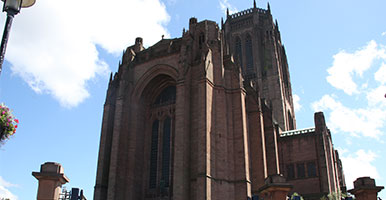Jim Gill OBE
Presented by Professor Frank Sanderson
Honorable Pro-Chancellor, I have pleasure in presenting Jim Gill for the award of an Honorary Fellowship from Liverpool John Moores University.
"Liverpool is on the up" This is the positive - and accurate - strapline of the newly formed company, Liverpool Vision, led by the urban regeneration specialist Jim Gill.
Jim's challenge is to consolidate and accelerate the economic recovery and growth of the last decade and build a sustainable economy, able to compete effectively in international markets. Jim has been at the heart of the dramatic growth in Liverpool over the past decade in his role of CEO of Liverpool Vision Mk1 which was the UK's first urban regeneration company.
In this role, he oversaw the massive redevelopment of Liverpool city centre, including that of the historic waterfront. So for Jim it is in a sense more of the same except that the new company has merged his former company with Liverpool Land Development Company, and Business Liverpool, thereby facilitating a much more integrated approach to economic and physical development and business and enterprise support.
Born in Cheshire in 1949, Jim absorbed useful lessons from his parents, Harry and Elsie, not least the importance of hard work and integrity. After primary school at Rainford, he had a rewarding time at Upholland Grammar School where he played rugby and football and achieved excellent A Levels.
Not sure what to do next, he went to the London School of Economics, thereby becoming the first member of his family to attend university. After graduating with an honours degree in Economics, he completed a Masters degree in Regional Studies at the University of Sussex.
Thereafter he worked in various jobs with the DTI and the Department of the Environment in the South-East, mainly specialising in regional and industrial economics. In 1980, he was back in the north-west working for the DTI on regional selective assistance for industry.
Then in 1981, the Merseyside Task Force was set up in the wake of the Toxteth Riots and Jim came to Liverpool to head up the newly established DTI Office. Through his office, regional assistance was provided for many projects, including the establishment of Wavertree Technology Park, the upgrade of the Plessy site on Edge Lane, the building of the prestigious Mercury Court development on the site of Liverpool's Exchange Station, and the acquisition of Phil Redmond's Brookside.
By the mid 1980s, Jim was back in Manchester running DTI's regional office, and in 1990 joined AMEC Regeneration where he has his first experience of public-private partnerships. By the mid-1990s, he was Regional Director of English Partnerships based at Mercury Court in Liverpool.
When I asked him how EP North West had managed to acquire a disproportionate 22 percent of the national budget, his answer revealed both his pride and his competitive instinct: "It is because we were good, we were more energetic and smarter than the other regions."
A key initiative was the establishment of the Speke-Garston Development Co as a joint venture with Liverpool City Council. Projects included: Development of Liverpool Airfield site and Redevelopment of the Bryant & May Factory Development with Jaguar of a Supplier Park.
In the late 1990s, Jim became national commercial director for English Partnerships. But he was missing the day-to-day involvement in projects on the ground, and so didn't take long to accept David Henshaw's offer for him to become the first Chief Executive of Liverpool Vision in 2001. It helped that he got on well with the Chairman, Sir Joe Dwyer - Joe had a high regard for him and implicit faith in his judgement.
What can Jim Gill claim as his legacy in Liverpool?
The simple answer is "Take a look around". A life-long MU supporter and current season-ticket holder, Jim first came to Liverpool in 1963 to watch Everton beat Manchester United - how times have changed - and he was back in Liverpool in 1980 and the economic stagnation was still plain to see.
In 2008, major regeneration is tangible: there has been a long period of economic growth and political stability, a sustained surge in entrepreneurial activity, more effective use of public finances, and currently Capital of Culture status.
Liverpool Vision under Jim Gill's leadership can claim no small credit in helping the City take full advantage of these opportunities.
Jim looks forward to a time in the near future when Liverpool city centre is not a building site, when it has taken another step-change in its economy, and when more and more people are living and working in Liverpool.
In the 2007 New Year's Honours List, Jim Gill's impressive contribution to the city was recognised nationally when he was awarded an OBE for services to regeneration.
Thanks to Jim Gill and his team, Liverpool is most definitely on the up, and we wish to add our acknowledgement of his achievements by awarding him a Fellowship.
Thus I have pleasure in presenting Jim Gill, this most distinguished son of our region, for admission to our highest honour of Fellow of Liverpool John Moores University.



